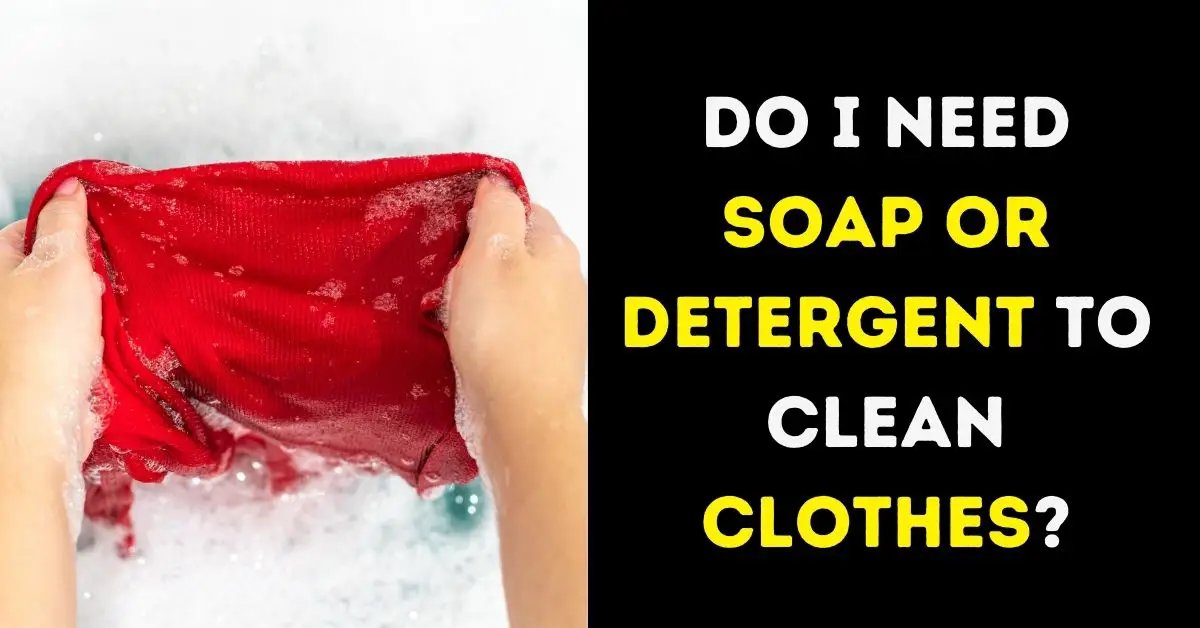
From ancient times, when washing meant scrubbing clothes on stones beside rivers, to the rise of natural soaps and now the era of sophisticated detergents, our laundry practices have undergone significant transformations.
Today, one of the prevailing dilemmas many of us face is choosing between trusted traditional soap and efficient modern-day detergents. Which one truly stands out when it comes to effective cleaning?
Detergent is generally better for cleaning clothes. It’s formulated to work in modern washing machines and is more effective at removing stains and dirt compared to traditional laundry soap.
In this exploration, we will shed light on the unique characteristics of both, weighing their pros and cons to guide you in making the best choice for your laundry.
8 Reasons Why Detergent Is Better Than Soap In Cleaning Clothes

Here’s a look at why detergents might have the edge when it comes to laundry:
1. Effective in Hard Water
Detergents can work effectively in hard water, whereas soaps often struggle. Hard water contains minerals that can react with soap to form a curd, which can be tough to rinse out. Detergents don’t form these curds, ensuring a cleaner wash.
2. Tailored Formulations
Detergents are available in specialized formulas tailored for specific cleaning needs, such as for whites, colors, delicates, or stain-removal. This allows for a more targeted approach to tackling laundry challenges.
3. Consistency in Performance
Unlike natural soaps, which can vary in composition, detergents are synthetic and manufactured to maintain consistent quality and performance, ensuring uniform results with every wash.
4. Better Stain Removal
Detergents contain surfactants, which are specially designed to lift and remove stubborn dirt and stains from fabrics. This makes them particularly effective at treating a wide variety of stains, from grease to wine.
5. Less Residue
Detergents are formulated to leave less residue on clothes compared to soap. Soap can sometimes leave a filmy residue, which can make fabrics feel stiff and potentially cause skin irritation.
6. Brightening and Whitening Agents
Many detergents come equipped with optical brighteners or whitening agents that make white clothes appear whiter and colored garments look more vibrant.
7. Enhanced with Additives
Modern detergents can be enhanced with a range of additives, including fabric softeners, fragrances, and enzymes, which can further boost cleaning power or add pleasant scents.
8. Economic in the Long Run
Given the concentrated formulas of many detergents, only a small amount may be required per wash, making them more cost-effective in the long run compared to soaps which might be used up faster.
Factors to Consider When Choosing Between Soap and Detergent
Selecting the ideal cleaning agent for your laundry can seem straightforward, but there’s more to it than meets the eye. When torn between traditional soap and modern detergents, several factors come into play:
1. Water Hardness
- Soap: Struggles in hard water due to the presence of minerals that can react with soap, forming a curd-like substance that can be difficult to rinse out.
- Detergent: Specifically designed to work well in both soft and hard water without forming any residues.
2. Type of Stains
- Soap: Effective against certain types of stains, especially organic or natural ones.
- Detergent: Contains surfactants that can tackle a broader range of stains, from oils to dyes.
3. Environmental Concerns
- Soap: Typically biodegradable and often produced with fewer pollutants. However, the greywater (wastewater from washing) might affect certain plants if used for irrigation due to its alkalinity.
- Detergent: Can contain phosphates and other chemicals that might be less eco-friendly. There are, however, many eco-friendly detergent alternatives available.
4. Skin Sensitivity
- Soap: Natural soaps can be gentler on the skin, especially those free from fragrances and additives.
- Detergent: Some may contain irritants, but hypoallergenic detergents are formulated for sensitive skin.
5. Residue on Clothes
- Soap: Can sometimes leave a filmy residue on fabrics, which can feel stiff and potentially cause minor skin irritation.
- Detergent: Typically designed to rinse out more cleanly, leaving fewer residues on clothes.
6. Cost and Efficiency
- Soap: Might require more product to get the desired cleanliness, especially in hard water.
- Detergent: Concentrated formulas mean you often use less product per wash, potentially saving money over time.
7. Fragrance and Additives
- Soap: Natural soaps might have milder fragrances derived from natural sources or be fragrance-free.
- Detergent: Comes in a variety of fragrances, and some are enriched with additives like fabric softeners or stain removers.
8. Storage and Shelf Life
- Soap: Solid soap bars might need to be stored in dry places and can degrade over time.
- Detergent: Liquid and powder forms have a longer shelf life, and packaging often makes them easier to store.
Is It Okay to Wash Clothes with Just Water?
Certainly, washing clothes with only water is an option that some might consider, especially when aiming for a gentle clean or if the clothes are lightly soiled.
While it’s entirely possible to wash clothes with just water, the outcomes might not be as thorough or effective as when using laundry detergents.
Factors like the degree of soiling, fabric type, and individual preferences will determine whether a water-only wash meets one’s needs.
FAQs
Do you really need soap to wash clothes?
Can you wash clothes with dish soap instead of detergent?
Can I use shampoo as a laundry detergent?
Final Words
In the contest between soap and detergent for laundry efficiency, detergents generally come out on top, offering superior cleaning, especially in challenging conditions.
While natural soaps have their merits, particularly for eco-conscious users or those with sensitive skin, detergents often provide a more effective solution for diverse stains and water types.
While detergents hold the edge in cleaning power, the best choice depends on individual needs and priorities.
